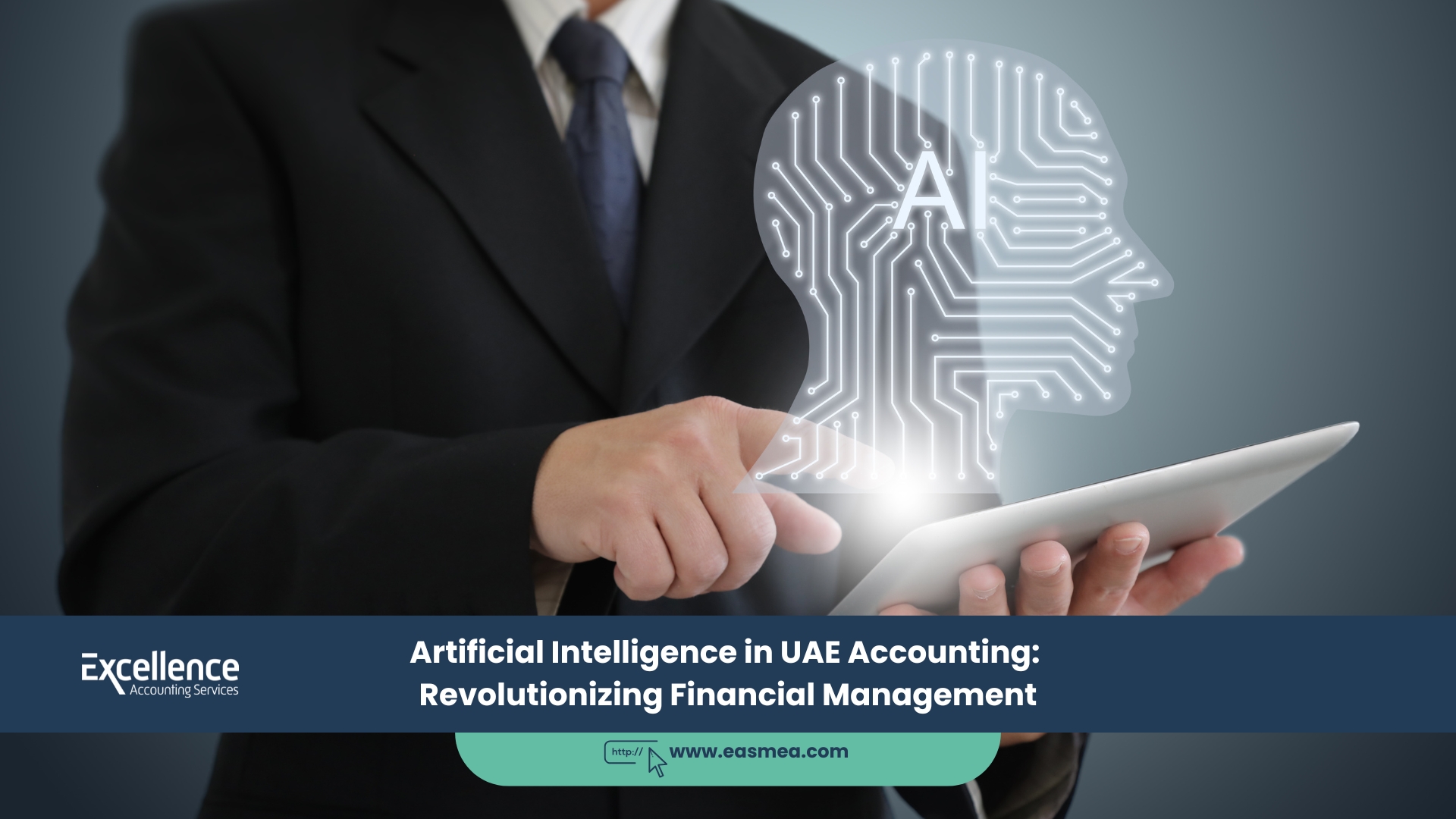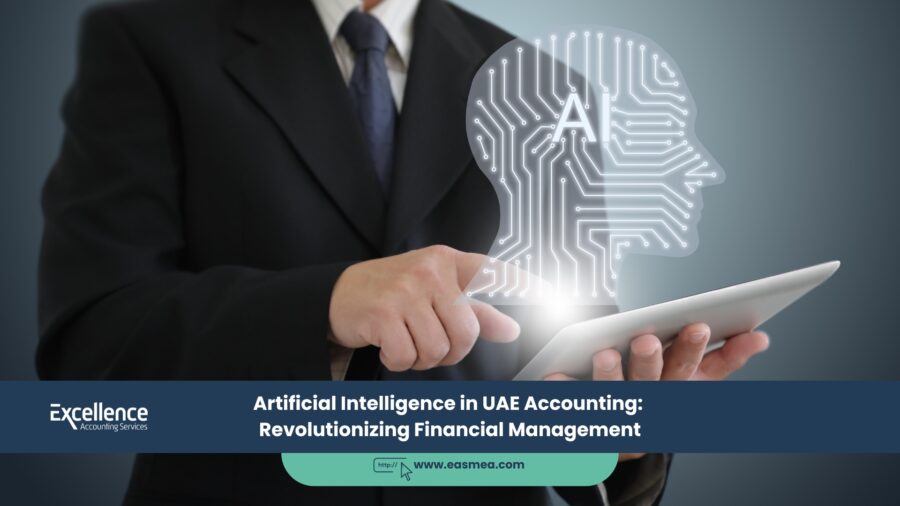The United Arab Emirates (UAE) has long been recognized as a global hub for innovation and technological advancement. As we approach 2025 and beyond, the UAE accounting sector in the UAE is undergoing a profound transformation, driven by the rapid adoption of Artificial Intelligence (AI). This technological revolution is not just changing the way financial professionals work; it’s redefining the very essence of UAE accounting and financial management in the region.
- The AI Revolution in UAE Accounting
- Key AI Applications in UAE Accounting
- The Impact of AI on UAE Accounting Roles
- Benefits of AI in UAE Accounting
- Challenges and Considerations
- Future Trends in AI Accounting for UAE
- Excellence Accounting Services: Embracing AI for Your Business
- FAQs About AI in UAE Accounting
- Conclusion
The AI Revolution in UAE Accounting
Artificial Intelligence is far more than a trendy buzzword in the UAE’s accounting industry. It represents a fundamental shift in how financial data is processed, analyzed, and utilized to drive business decisions. In a country where embracing cutting-edge technologies is part of the national vision, AI has found fertile ground to flourish in the financial sector.

Key AI Applications in UAE Accounting
The integration of AI in UAE accounting practices is multifaceted, touching every aspect of financial management:
- Automated Bookkeeping: Gone are the days of manual data entry and tedious reconciliation processes. AI-powered systems now handle these tasks with remarkable speed and accuracy. These intelligent systems can process transactions, categorize expenses, and reconcile accounts with minimal human intervention. This not only saves time but also significantly reduces the likelihood of human error, ensuring more accurate financial records.
- Fraud Detection: In an era where financial fraud is becoming increasingly sophisticated, AI serves as a vigilant guardian. Machine learning algorithms can analyze vast amounts of financial data, identifying unusual patterns and potential fraudulent activities far more quickly and accurately than traditional methods. These AI systems learn from each transaction, continuously improving their ability to detect anomalies and protect businesses from financial misconduct.
- Predictive Analytics: One of the most powerful applications of AI in UAE accounting is its ability to forecast financial trends. By analyzing historical data and current market conditions, AI can provide businesses with invaluable insights into future financial performance. This predictive capability enables companies to make proactive decisions, adjust strategies in real-time, and stay ahead of market fluctuations.
- Tax Compliance: Navigating the complex world of tax regulations can be challenging, especially in a dynamic economic environment like the UAE. AI tools are now being employed to stay updated with the latest tax laws and ensure businesses remain compliant. These systems can automatically apply relevant tax rules to financial transactions, reducing the risk of costly errors and penalties.
- Auditing: The auditing process has been revolutionized by AI. Intelligent systems can now process and analyze vast amounts of financial data, making audits more thorough and efficient. AI can quickly identify discrepancies, unusual transactions, or areas that require further investigation, allowing human auditors to focus on more complex analytical tasks.
The Impact of AI on UAE Accounting Roles
As AI takes over many routine and time-consuming tasks, the role of accountants in the UAE is evolving significantly. Contrary to fears of job displacement, AI is actually empowering UAE accounting professionals to focus on higher-value activities that require human insight and strategic thinking.
| Traditional Role | AI-Enhanced Role |
|---|---|
| Data Entry | Data Analysis and Interpretation |
| Manual Reconciliation | Strategic Financial Planning and Forecasting |
| Basic Reporting | Advanced Business Insights and Consulting |
| Routine Calculations | Risk Assessment and Management |
| Time-consuming Audits | Continuous Auditing and Real-time Reporting |
| Compliance Checking | Proactive Compliance Strategy Development |
This shift is creating new opportunities for accountants to become strategic advisors to businesses, leveraging their financial expertise alongside AI-generated insights to drive growth and innovation.
Benefits of AI in UAE Accounting
The adoption of AI in UAE accounting brings a myriad of advantages to UAE businesses, transforming financial management from a necessary business function to a strategic asset:
- Increased Accuracy: By minimizing human errors in data entry and calculations, AI significantly improves the accuracy of financial records and reports. This enhanced precision is crucial for making informed business decisions and maintaining regulatory compliance.
- Enhanced Efficiency: Automated processes powered by AI save substantial time and resources. Tasks that once took days or weeks can now be completed in hours or even minutes, allowing businesses to operate with greater agility and responsiveness.
- Real-time Insights: AI provides up-to-the-minute financial data and analysis, enabling businesses to make decisions based on the most current information available. This real-time capability is particularly valuable in the fast-paced UAE business environment, where market conditions can change rapidly.
- Cost Reduction: While the initial investment in AI technology may be significant, the long-term savings through reduced manual labor, improved accuracy, and enhanced decision-making can be substantial. AI can help businesses optimize their financial operations, identifying areas for cost savings and efficiency improvements.
- Improved Compliance: Navigating the complex regulatory environment in the UAE and internationally can be challenging. AI helps businesses stay compliant with ever-changing financial regulations, automatically updating processes and reports to meet the latest requirements.
“AI is not just changing how we do UAE accounting; it’s redefining what’s possible in financial management. In the UAE, where innovation is a national priority, AI is enabling businesses to achieve new levels of financial insight and operational excellence.” – UAE Finance Expert
Challenges and Considerations
While the benefits of AI in UAE accounting are clear, implementing these technologies also comes with challenges that UAE businesses must navigate:
- Data Security: As AI systems process vast amounts of sensitive financial information, ensuring robust data security is paramount. Businesses must implement strong cybersecurity measures to protect against data breaches and maintain client trust.
- Integration with Existing Systems: Seamlessly incorporating AI into current UAE accounting processes can be complex, especially for businesses with legacy systems. Careful planning and potentially significant IT infrastructure updates may be necessary to ensure smooth integration.
- Training and Adaptation: The shift to AI-enhanced UAE accounting requires accountants and financial professionals to upskill and adapt to new ways of working. Businesses need to invest in comprehensive training programs to ensure their staff can effectively leverage AI tools and interpret AI-generated insights.
- Initial Investment: The upfront cost of implementing AI solutions can be significant, including expenses for software, hardware, training, and potential consulting services. Businesses need to carefully assess the return on investment and plan for these initial costs.
- Ethical Considerations: As AI takes on more decision-making roles in financial processes, businesses must grapple with ethical questions about transparency, accountability, and potential biases in AI algorithms.
Future Trends in AI Accounting for UAE
Looking ahead, several exciting trends are shaping the future of AI in UAE accounting:
- Blockchain Integration: The combination of AI with blockchain technology promises to enhance security, transparency, and traceability in financial transactions. This integration could revolutionize auditing processes and provide unprecedented levels of trust in financial reporting.
- Natural Language Processing: Advanced AI systems that can understand and generate human-like financial reports are on the horizon. This technology will make financial information more accessible and understandable to non-financial stakeholders, improving communication and decision-making across organizations.
- IoT in Accounting: The integration of data from Internet of Things (IoT) devices will enable more comprehensive and real-time financial tracking. For example, IoT sensors could automatically track inventory levels or equipment usage, feeding this data directly into UAE accounting systems for more accurate and timely financial management.
- AI-Powered Financial Advisors: Virtual assistants equipped with sophisticated AI algorithms will provide personalized financial advice to businesses. These AI advisors will be able to analyze complex financial data and market trends to offer strategic recommendations tailored to each company’s unique situation.
- Continuous Auditing: Real-time, AI-driven auditing processes will become the norm, flagging issues instantly and allowing for immediate corrective action. This shift from periodic to continuous auditing will significantly enhance financial oversight and risk management.
Excellence Accounting Services: Embracing AI for Your Business
At Excellence Accounting Services, we’re at the forefront of AI integration in UAE accounting, offering cutting-edge solutions to help UAE businesses thrive in the digital age. Our AI-enhanced services include:
- AI-enhanced bookkeeping and reconciliation: Leveraging advanced algorithms to automate routine UAE accounting tasks with unparalleled accuracy and efficiency.
- Predictive financial modeling using machine learning: Utilizing sophisticated AI models to forecast financial trends and help businesses make data-driven decisions.
- Automated tax compliance checks: Employing AI to ensure your business stays compliant with the latest UAE and international tax regulations.
- Real-time financial dashboards powered by AI analytics: Providing instant insights into your company’s financial health through intuitive, AI-driven visualizations.
- AI-assisted audit preparation and support: Streamlining the audit process with AI-powered data analysis and anomaly detection.
We understand that each business is unique, which is why we tailor our AI solutions to meet your specific needs, ensuring you get the most out of this revolutionary technology. Our team of experts works closely with you to implement AI solutions that align with your business goals and enhance your financial management capabilities.
FAQs About AI in UAE Accounting
AI is transforming the role of UAE accountants from data processors to strategic advisors. With AI handling routine tasks like data entry and basic calculations, accountants in the UAE are now focusing on interpreting financial data, providing strategic insights, and guiding businesses in financial decision-making.
This shift requires accountants to develop new skills in data analysis, AI technology, and strategic thinking, making their roles more valuable and intellectually stimulating.The evolution of the accountant’s role in the AI era includes:
- Becoming data scientists, analyzing complex financial information to derive actionable insights
- Acting as strategic partners to business leaders, using AI-generated insights to inform critical decisions
- Developing expertise in AI and machine learning to oversee and optimize AI-driven accounting processes
- Focusing on high-level financial strategy and risk management
- Enhancing their advisory capabilities to help businesses navigate complex financial landscapes
This transformation is creating exciting opportunities for accountants to add significant value to businesses and play a crucial role in shaping financial strategies in the UAE’s dynamic economic environment.
Implementing AI in UAE accounting offers numerous benefits for UAE businesses:
- Increased accuracy in financial reporting and calculations, minimizing errors and enhancing the reliability of financial data
- Significant time savings through automation of routine tasks, allowing finance teams to focus on strategic activities
- Enhanced fraud detection capabilities, using advanced algorithms to identify suspicious patterns and transactions
- Real-time financial insights for better decision-making, enabling businesses to respond quickly to market changes
- Improved compliance with ever-changing financial regulations, reducing the risk of penalties and legal issues
- Cost reduction in the long term through increased efficiency and reduced need for manual processing
- Ability to handle larger volumes of financial data, scaling financial operations without proportional increases in staff
- More personalized financial services and advice, tailored to each business’s unique needs and goals
These benefits collectively contribute to more robust financial management, improved operational efficiency, and enhanced competitive advantage for UAE businesses in the global marketplace.
While AI offers many benefits, there are potential risks to consider:
- Data security and privacy concerns, especially with sensitive financial information
- Over-reliance on AI systems without proper human oversight, potentially leading to unchecked errors
- Potential job displacement for those in traditional accounting roles, necessitating reskilling and adaptation
- Errors in AI algorithms leading to financial misstatements or incorrect decision-making
- Compliance issues if AI systems are not regularly updated with the latest regulations
- Initial implementation costs and disruption to existing processes during the transition period
- Ethical considerations in AI decision-making processes, including potential biases in algorithms
To mitigate these risks, businesses should:
- Implement robust security measures and data protection protocols
- Ensure proper training for staff to work alongside AI systems effectively
- Maintain human oversight and regular audits of AI-driven processes
- Invest in continuous learning and development programs for accounting staff
- Work with reputable AI providers and regularly update systems
- Develop clear ethical guidelines for AI use in financial management
By addressing these risks proactively, UAE businesses can maximize the benefits of AI in UAE accounting while minimizing potential drawbacks.
Small businesses in the UAE can leverage AI in UAE accounting to:
- Automate time-consuming bookkeeping tasks, freeing up resources for core business activities
- Access sophisticated financial analysis tools previously available only to larger corporations
- Improve cash flow management through predictive analytics and real-time insights
- Ensure tax compliance with less effort and greater accuracy, reducing the risk of costly errors
- Reduce costs associated with manual accounting processes, improving overall financial efficiency
- Make data-driven decisions with real-time financial insights, enhancing competitiveness
- Scale their financial operations more efficiently as the business grows
AI-powered accounting solutions are becoming more affordable and user-friendly, making them accessible to small businesses with limited resources. These tools can level the playing field, allowing smaller enterprises to compete more effectively with larger companies in terms of financial management and strategic planning.
For small businesses, AI can be particularly beneficial in:
- Streamlining invoice processing and payment collection
- Providing accurate financial forecasts to support growth planning
- Offering insights into cost-saving opportunities and revenue optimization
- Simplifying tax preparation and compliance processes
- Enhancing financial reporting for stakeholders and potential investors
By adopting AI-driven accounting solutions, small businesses in the UAE can improve their financial health, make more informed decisions, and focus on growth and innovation.
To thrive in an AI-driven accounting environment, UAE accountants should focus on developing:
- Data analysis and interpretation skills: The ability to work with large datasets and derive meaningful insights
- Understanding of AI and machine learning concepts: Knowledge of how AI systems work and their applications in finance
- Strategic thinking and business advisory capabilities: Skills to translate AI-generated insights into actionable business strategies
- Proficiency in using AI-powered accounting software: Hands-on experience with the latest AI tools and platforms
- Cybersecurity awareness: Understanding of data protection principles and best practices
- Ethical decision-making in an AI context: Ability to navigate ethical considerations in AI-driven financial processes
- Soft skills like communication and client relationship management: Crucial for explaining complex AI-generated insights to non-technical stakeholders
- Continuous learning aptitude: Willingness to stay updated with rapidly evolving AI technologies and their applications in accounting
Accountants should also develop:
- Critical thinking skills to question and validate AI-generated results
- Project management abilities to oversee AI implementation in accounting processes
- Cross-functional collaboration skills to work effectively with IT and data science teams
- Risk management expertise to identify and mitigate potential issues in AI-driven financial systems
By developing these skills, UAE accountants can position themselves as valuable assets in the AI-driven future of finance, combining technological proficiency with human insight and expertise.
AI is revolutionizing audit processes in the UAE by:
- Analyzing entire datasets rather than samples, increasing audit accuracy and comprehensiveness
- Identifying anomalies and potential fraud more effectively through advanced pattern recognition
- Automating routine audit tasks, allowing auditors to focus on complex issues and risk assessment
- Providing continuous auditing capabilities for real-time risk assessment and financial monitoring
- Enhancing predictive analytics to identify future financial risks and opportunities
- Improving the speed and efficiency of audit procedures, reducing time and costs
- Offering more insightful audit reports through advanced data analysis and visualization
These improvements lead to more thorough, efficient, and valuable audit services for UAE businesses. AI-enhanced audits can:
- Detect subtle patterns and relationships in financial data that human auditors might miss
- Reduce the risk of human error in the audit process
- Provide a more holistic view of an organization’s financial health and risk profile
- Enable more frequent and timely audits, supporting better financial management
- Enhance the ability to comply with complex and changing regulatory requirements
By leveraging AI in auditing, UAE businesses can benefit from more robust financial oversight, improved risk management, and greater stakeholder confidence in financial reporting.
As AI becomes more prevalent in UAE accounting, regulatory considerations include:
- Ensuring AI systems comply with UAE financial regulations and international standards such as IFRS
- Adhering to data protection and privacy laws, especially concerning sensitive financial information
- Maintaining transparency in AI decision-making processes for auditing purposes and regulatory compliance
- Ensuring ethical use of AI in financial practices, including fair and unbiased treatment of data
- Adapting to potential new regulations specific to AI in financial services as they emerge
- Compliance with anti-money laundering (AML) and know your customer (KYC) regulations in AI-driven processes
- Regular audits of AI systems to ensure accuracy, reliability, and compliance with current standards
Businesses and accounting firms must:
- Stay informed about evolving regulations related to AI and financial technology
- Implement governance structures to oversee AI use in accounting processes
- Ensure their AI systems are adaptable to regulatory changes and can be easily updated
- Maintain detailed documentation of AI algorithms and decision-making processes for regulatory scrutiny
- Collaborate with regulatory bodies to shape responsible AI use in accounting
The UAE government is likely to introduce more specific guidelines for AI in financial services, and businesses should be prepared to adapt quickly to these changes.
To prepare for AI integration in accounting, UAE businesses should:
- Assess current accounting processes to identify areas where AI can add value
- Invest in employee training to build AI-related skills and foster a culture of technological adaptation
- Start with small-scale AI projects to gain experience and build confidence before full-scale implementation
- Ensure data quality and standardization to maximize AI effectiveness and reliability
- Collaborate with AI experts or consultants for smooth implementation and customized solutions
- Develop a clear AI strategy aligned with overall business goals and financial objectives
- Create a change management plan to address potential resistance and ensure smooth transition
- Regularly review and update cybersecurity measures to protect sensitive financial data
- Stay informed about AI advancements and best practices in accounting through industry networks and continuing education
Additional steps include:
- Conducting a cost-benefit analysis to justify AI investment
- Establishing key performance indicators (KPIs) to measure the success of AI implementation
- Creating cross-functional teams to oversee AI integration, including IT, finance, and operations personnel
- Developing a roadmap for phased AI implementation to manage the transition effectively
- Regularly communicating the benefits and progress of AI integration to all stakeholders
By taking these proactive steps, UAE businesses can position themselves to leverage AI effectively in their accounting processes, gaining a competitive edge in the evolving financial landscape.
The cost of implementing AI in UAE accounting can vary widely depending on the scale and complexity of the solution. Considerations include:
- Initial investment in AI software and hardware, which can be substantial for comprehensive systems
- Costs associated with data migration and system integration with existing accounting infrastructure
- Employee training and potential hiring of AI specialists or data scientists
- Ongoing maintenance and updates of AI systems to ensure optimal performance and compliance
- Potential savings from reduced manual labor and increased efficiency in accounting processes
- Long-term ROI through improved accuracy, strategic insights, and enhanced decision-making capabilities
While the initial costs can be significant, many businesses find that the long-term benefits and efficiency gains outweigh the investment. Cost factors to consider:
- Subscription fees for cloud-based AI accounting solutions, which can be more cost-effective for smaller businesses
- Customization costs for tailoring AI solutions to specific business needs
- Potential reduction in staffing costs as routine tasks become automated
- Savings from improved accuracy, reducing costly errors and potential compliance issues
- Enhanced revenue opportunities through better financial insights and strategic planning
Businesses should conduct a thorough cost-benefit analysis, considering both short-term expenses and long-term value creation when evaluating AI implementation in their accounting processes.
AI is transforming financial forecasting and planning in UAE businesses by:
- Analyzing vast amounts of historical and real-time data for more accurate predictions
- Identifying complex patterns and trends that humans might miss, leading to more nuanced financial insights
- Providing scenario analysis and simulations for better strategic planning and risk assessment
- Offering real-time updates to forecasts as new data becomes available, enabling agile financial management
- Integrating external factors (e.g., market trends, economic indicators) into forecasts for a more comprehensive view
- Automating the creation of financial models and reports, saving time and reducing human error
- Enhancing cash flow predictions for better liquidity management and investment planning
- Enabling more dynamic and flexible budgeting processes that can adapt to changing business conditions
These AI-driven capabilities allow UAE businesses to:
- Make more informed financial decisions based on data-driven insights
- Adapt quickly to changing market conditions and economic fluctuations
- Identify potential financial risks and opportunities earlier
- Optimize resource allocation and investment strategies
- Improve overall financial performance through more accurate planning and forecasting
AI is particularly valuable in the UAE’s dynamic economic environment, where businesses must navigate global market forces, regional economic policies, and rapid technological changes.
By leveraging AI in financial forecasting and planning, UAE businesses can gain a competitive edge and build more resilient financial strategies.
Conclusion
The integration of AI in UAE accounting is not just a trend; it’s a fundamental shift in how financial management operates. As we move towards 2025 and beyond, businesses that embrace AI will gain a significant competitive advantage.
The benefits of increased accuracy, efficiency, and strategic insight far outweigh the challenges of implementation and adaptation.
AI is reshaping the role of accountants, transforming them from number crunchers to strategic advisors. This evolution opens up new opportunities for finance professionals to add value to businesses through data-driven insights and forward-thinking financial strategies.
For UAE businesses, the adoption of AI in accounting is becoming increasingly crucial to staying competitive in the global market. From small enterprises to large corporations, AI offers scalable solutions that can drive financial excellence and support business growth.
At Excellence Accounting Services, we’re committed to helping our clients navigate this exciting new landscape. We understand the unique challenges and opportunities that AI presents in the UAE’s financial sector.
Our team of experts is dedicated to ensuring that businesses reap the full benefits of AI in accounting while mitigating potential risks.
As we look to the future, it’s clear that AI will continue to evolve and bring new innovations to the field of accounting. Businesses that start their AI journey now will be well-positioned to adapt to future advancements and maintain a leading edge in financial management.
Are you ready to revolutionize your accounting processes with AI? The time to act is now. Contact Excellence Accounting Services today to learn how we can help your business thrive in the AI-driven future of finance.
Let us guide you through the implementation of cutting-edge AI solutions tailored to your specific needs, ensuring that your business is at the forefront of financial innovation in the UAE.
Embrace the power of AI in UAE accounting and unlock new levels of financial insight, efficiency, and strategic capability for your business. The future of finance is here – are you ready to lead the way?




